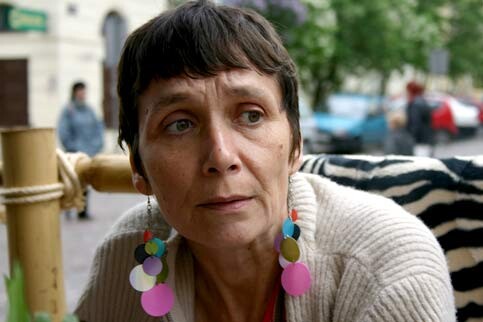The Electronic Intifada 28 March 2005

Kate Baillie
Kate Baillie, writer and travel-guide author, democratic-left activist and much-loved friend of all who knew her, passed away peacefully in France on 12 March after a debilitating fight with an untreatable cancer. She would have celebrated her 48th birthday on March 28. In her last days, she exuded the humour, tough realism and combative free spirit that she wore proudly throughout her brief life. Katy was thoroughly her own woman until the very end, when only her spirit remained unbeaten by disease.

But perhaps she was most unique, and loved, for her extraordinary commitment to combating injustice; in particular those that she felt somehow implicated her, as a wayward daughter of the English aristocracy. Kate Baillie’s political trajectory was consistent, from when she completed her first degree in Literature at Cambridge and soon joined the Battersea Labour Party, to her last years which took her and her partner to places she had always wanted to experience (Panama, Palestine and lastly, the Cote d’Or region of France).
She worked on many projects of the British left starting as a volunteer editor on the cooperatively run East End News, and joining the Communist Party in the early eighties. There, her vast energy contributed to many campaigns including the struggle against the poll tax and the low and difficult days of the miners’ struggles for justice and a safe and secure future.
Katy was a brave woman and indignant solidarity activist when caught under the bombing of Beirut in 1982 during the Israeli invasion of Lebanon. She had no qualms about going to a journalists’ conference in Algeria during its darkest days of fundamentalist violence in the late 1980s. By the time she finally made it to Palestine in late 2003, she had honed the persuasive skills needed to get her through strict Israeli controls into Gaza when even diplomats couldn’t penetrate the blockade. Only Katy could blithely tell the uncooperative Israeli security staff without blinking an eye: “Yes, I need to enter Gaza to visit a friend I haven’t seen in twenty years before my terminal cancer gets me - and here is the methadone to prove it.” Who could refuse Katy after all?
Perhaps her most exhaustive contribution was to Wales, where she moved in the 1980s and immediately adopted. There she threw herself into campaigns for opposition to the first Gulf War, the struggles to keep the pits open, the difficult fight for devolution and Palestinian justice and peace. She stayed in the Communist Party during the difficult period of its transformation into Democratic Left Wales. She again put her writing skills to good use as editor of the Barcud Coch (The Red Kite) a small but influential radical cross-party journal. It was here that her commitment to sensible politics, inclusiveness and pluralism came to the fore. She was persistent in ensuring that the magazine was accessible and independent and she encouraged readers to take more control of their lives.
Katy recognised and cherished that difference was an essential part of the human condition. Her passion for justice and fiery commitment to freedom led many younger people to a greater understanding of UK politics as well as issues such as human rights, colonialism and the importance of gender relations. While never ignoring the realities of people’s lives and struggles, Katy never stopped imagining a different world and a different way of getting there. One of her very last projects, which may yet see the light, was to establish a business start-up lending scheme for poor, unemployed Palestinians, which would work on the basis of trust and a hand-shake, flying in the face of conventional development credit. She wanted to (very sensibly) call it the “Palestinian Crazy Bank”.
Kate Baillie’s commitment to peace and reconciliation has left a lasting memorial in Carmarthenshire where she organised in 2003 the erection of a Peace Cairn and a meeting to encourage peace and reconciliation between the Israelis and Palestinians, for whom she always had enormous sympathy. She will be remembered and her life celebrated there by friends on April 30.
The authors both knew Kate Baillie for over twenty years. Raja Khalidi is a development economist based in Geneva, whose 1988 book on the Palestinian economy was edited by Kate. Peter Polish is Kate’s long-time partner, comrade and a leader of the democratic left in Wales. He accompanied Kate in her recent visit to Palestine and faithfully cared for her throughout her long illness.


